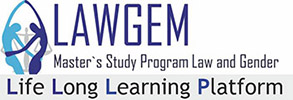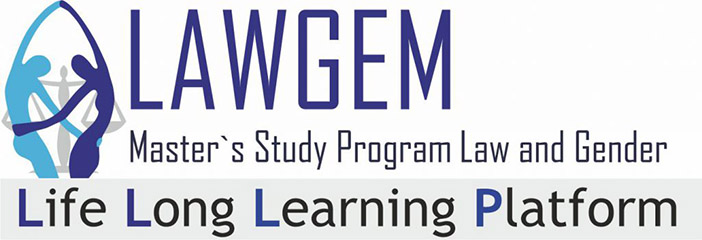The Faculty of Law University of Belgrade has been coordinating the prestigious Erasmus Plus KA203 project `New Quality in Education for Gender Equality: Strategic Partnership for the Development of Master`s Study Program LAW AND GENDER – LAWGEM` (http://lawgem.ius.bg.ac.rs), together with consortium partners from LUMSA University Palermo, Italy (Libera Universita Maria SS. Assunta di Roma, Department of Law); Orebro University, School of Law, Psychology and Social Work (Örebro Universitet), Sweden; University of Saaarland Faculty of Law, Europa Institut (Universitat des Saarlandes), Germany; University of Cadiz (Universidad de Cadiz), Spain.
The objectives of LAWGEM are, firstly, to build a fully innovative systemic curriculum of master‘s legal studies (the main intellectual outcome), which will encompass all relevant fields of legal education, as well as other relevant scientific fields – like economic analysis of law, criminology, sociology. The second intellectual outcome will be the Textbook relevant for the Law and Gender master‘s programme; the third intellectual outcome will be a legal clinic on gender equality, the forth one – an on-line platform for life-long learning on gender issues, which will contribute to disseminating awareness on gender equality and enhancing the knowledge and practice in the field of combatting all forms of gender-based discrimination, violence and sexual harassment. And the fifth intellectual outcome will be an empirical survey tool for investigating the academic staff`s opinion on gender equality issues related to the institutional, educational and cultural framework.
The necessity of a gender-sensitive approach in legal education emerges from the highest value and normative standards of modern international and national law. Educating students of law (future lawyers, judges, prosecutors, administrative workers, members of parliament and government bodies) in a gender-sensitive manner means a real investment in better legislation and a more correct interpretation and implementation of law. It also means an investment in a better future by sensitizing judges in particular, but also legal professionals in all fields of legal practice. This serves the fulfilment of the essence of contemporary law – equal respect and protection for all individuals. The aims of the programme shall be to offer adequate knowledge and skills for the work on jobs related to gender mainstreaming in all relevant fields of politics, law-making and law implementation in the judiciary, decision-making in the state administration, state/regional/local policy-making related to economics, social security, media, culture, and concerning the academic gender-sensitive knowledge production in the fields of law as well as social sciences and humanities.
The Law and Gender master programme, its implementation and sustainability are all based on high academic quality, and also on the fact that it complements the labour market`s need for highly productive and socially inclusive work conditions, rising from diminishing gender inequalities, all of which will contribute to enhancing the quality of legal studies and higher education. It will contribute to the establishment of a long-lasting network and cooperation between the Consortium members, as well as to the enhancement of the process of internationalization of higher education in the EU and Serbia (as an accession country).
The online lifelong learning platform has as its main aim to contribute to providing valuable sources for researchers, lecturers, students, non-govermental organizations, social partners and wide public on issues of importance for gender competent legal knowledge. Also, the platform will be used for the pilot implementation of the Curriculum and the Legal Clinic as early as 2022. The LLL platform will also be used for informal learning on gender equality, for a constant and wide range dissemination and promotion of gender equality, and for presenting examples of gender inequality in any area of life, in all Consortium members and wider. It will also be used for connecting with all networks gathered around the gender issues. Also, the platform will be used for introducing the Empirical Survey Tool, which can then be used by all other universities in order to analyse the current state of affairs regarding the gender (im)balance in their institutional designs, the quality of study programmes and textbooks from the gender perspective, and the value systems and “the hidden curriculum” among individual professors, their mutual relations and their relations with students (during the teaching process, exams, personal and professional communication, and from the point of pedagogic approaches).
Creating the online platform promotes innovative pedagogical approach and informal gender sensitive education among legal professionals and social and public servants, NGO representatives, and the general public. It will also enhance the gender issue awareness through the above mentioned formal and informal education. It will, thus, by itself contribute to internationalisation and social inclusion.
We do hope that visitors to the platform will obtain all-encompassing insights into the complexity of gender issues, with the ability to apply a gender sensitive approach to legal knowledge, understanding, intepreting and implementing legal norms. The learning outcome will thus not just remain at the level of knowledge production and teaching contents and methods, but also spread to their whole value system, overcoming the biases, prejudices and stereotypes. Also, platform will provide an opportunity for the students enrolled in the Law and Gender master`s programme, along with all the other students of the consortium universities, to implement the principles of life long learning, in both informal and formal education, and to move forwards in obtaining gender sensitive legal knowledge and reframing their whole mindset.
Leading partner for Law and Gender Lifelong Learning Platform is University of Belgrade Faculty of Law. Head of the LAWGEM project/contact person is Prof. Dr. Dragica Vujadinović, http://lawgem.ius.bg.ac.rs/people/dragica-vujadinovic/ (dragicav@ius.bg.ac.rs). Platform editor is Prof. Dr. Ljubinka Kovačević (ljubinka@ius.bg.ac.rs).

